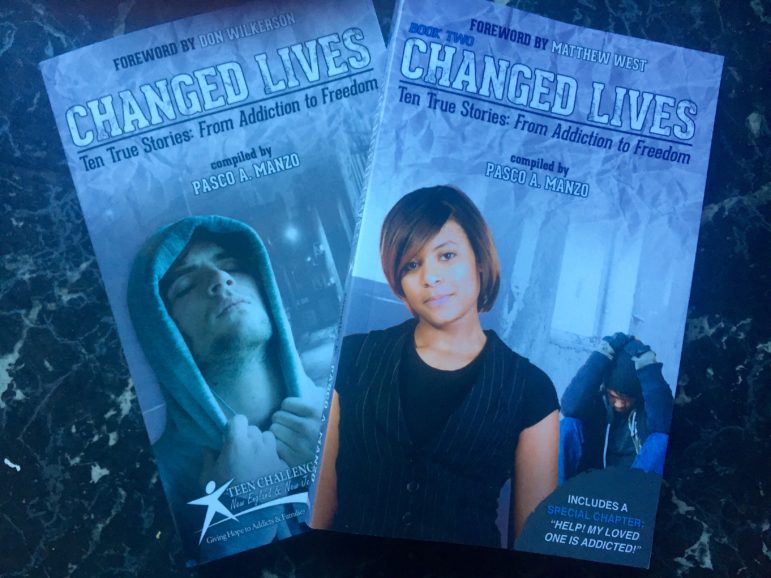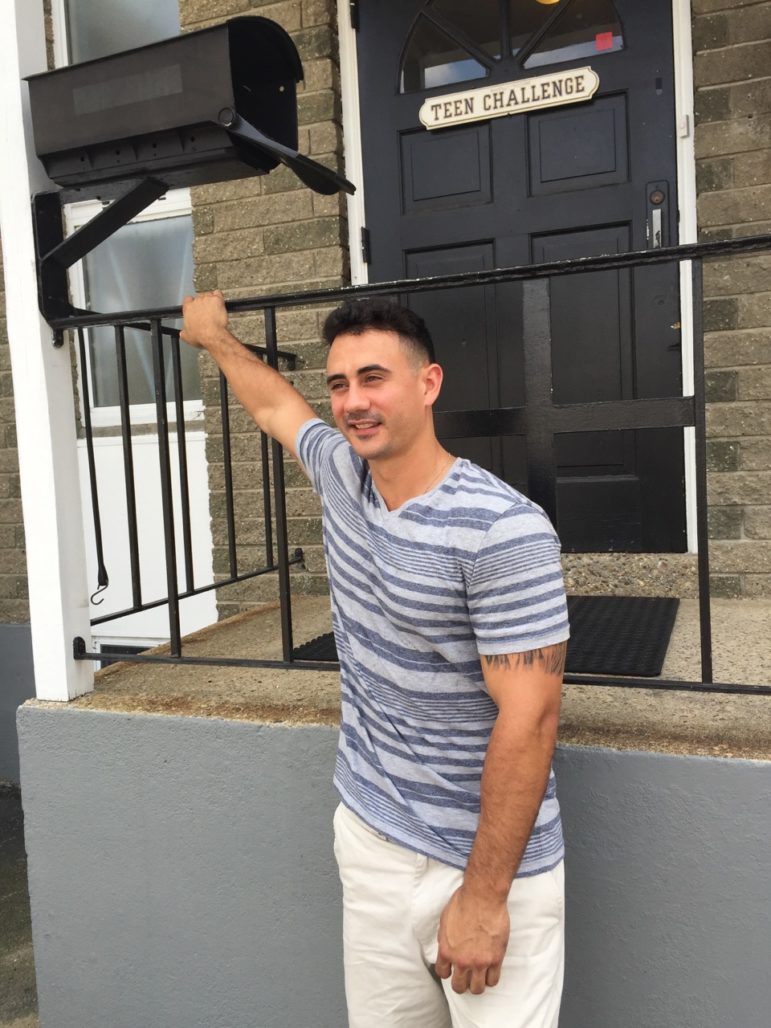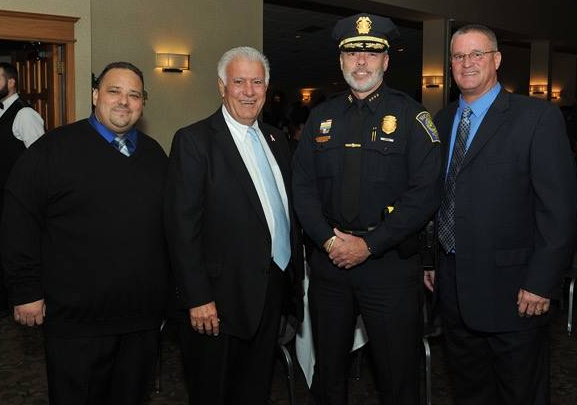
MANCHESTER, NH – As the city struggles to find a way out from under the weight of a crushing heroin addiction epidemic, there is a haven on Laurel Street that, for 15 years, has been the answer for many, quietly transforming the lives of addicts who have run out of hope.
Teen Challenge New England is a long-term residential addiction treatment center. At any given time two dozen men live, learn and worship at the Manchester campus together, surrendering their burdens and troubles to God as the first step in the long journey toward the goal of a new life, one that is free from the shackles of drug or alcohol addiction.
Actual cost to house, feed and rehabilitate each resident is about $3,400 monthly, according to program graduate Aaron Spooner, now Admissions Coordinator, who went there seeking help in 2005 and stayed to be part of the solution.
“But we charge residents $750 per month. That’s it,” says Spooner, a fraction of what other residential treatment programs in New Hampshire are charging.
As part of the admissions process, there is also a non-refundable $750 induction fee in addition to the first month’s sponsorship fee of $750 and a $150 medical fee to cover the cost of incidentals, like cough drops or over-the-counter medicine as needed over the course of 15 months, so an incoming resident would need $1,650 up front, and $750 per month after that.
“Out of 26 beds, we might have up to three who are paying fully, and another five to seven who are paying something to be here,” says Spooner. “The $750 per month covers everything.”
Program tuition can come from contributions from friends and family, and is supplemented by the non-profit organization’s fundraising events. But when it comes to the bottom line, no one is turned away for inability to pay, says Hector Andujar Jr., who does community outreach and program development for Teen Challenge. He can’t say enough about the transformative power of the program.
It saved his life.
His story is not untypical of those who find their way to the program. He arrived in March of 2014, broken from a life of verbal and physical abuse as a child, a deep pain which he found was dulled by the use of alcohol and drugs.
“I was volatile,” says Andujar. “My teen years were rough, in and out of trouble. After the age of 22 … I found myself slipping back into drugs by association, and using crack. I really went downhill. I was depressed, lonely – I fell into addiction, and trouble with the law.”
Andujar tried over the years to recover his life on his own. He fell in love in 2007 and was in a committed relationship. He felt ready to take on the responsibility of step-dad, and start a family of their own together. He felt like he was in a good place.
Then the weekend partying began.
“I was using coke again, and she didn’t know. Little by little the anger demon crept back into my life. I felt so resentful that, the last few years before I found Teen Challenge, I wasn’t even a father to my kids. I was spending money on drugs. Then, my girlfriend Carmen – who through the grace of God stood by me and is now my wife – gave me an ultimatum, which prompted me to change. At that point I wanted to die. I had always been able to stop using drugs on my own strength, but I was hopeless,” says Andujar.
His drug use was out of control. Carmen, now his fiancée, had gotten a restraining order against him. His oldest son confided in a school guidance counselor about the strife at home. His world was quickly unraveling.
“I contemplated driving off a bridge to end the pain of it all,” Andujar says. “That was really my plan.”
Instead, Andujar found his saving grace.
 “I was sleeping on my mother’s couch, and my brother was in detox at the time, and someone there mentioned Teen Challenge, and I remembered reading ‘The Cross and the Switchblade,’ years ago, when I was in a juvenile detention center,” says Andujar, now 41.
“I was sleeping on my mother’s couch, and my brother was in detox at the time, and someone there mentioned Teen Challenge, and I remembered reading ‘The Cross and the Switchblade,’ years ago, when I was in a juvenile detention center,” says Andujar, now 41.
That story, which became a movie starring Pat Boone as Rev. David Wilkerson, recounts how a small-town pastor felt led by God to create a ministry serving addicts and gang members in New York City in the 1950s, an outreach that has become Teen Challenge, a faith-centered program with 1,200 outposts around the country, including the Manchester campus.
“My brother, who was going through a lot of the same things I was, went to a secular rehab for six months. I didn’t want to go to a secular rehab, as I knew the success rates were so low. I called Teen Challenge,” says Andujar.
After so many years being lost, Andujar says was ready for the cycle of addiction to end. He says he knew he needed the hand of God to rescue him. He went into the program planning to spend only a few months at Teen Challenge.
“But God got hold of me and transformed me so dramatically, and I knew I needed the whole program. After about five months, I knew the call of God on my life was to serve at Teen Challenge and ended up relocating my family from Leominster [Mass.] to Manchester to do that,” he says.
History of the Progam
Teen Challenge New England & New Jersey, headquartered in Brockton, Mass., was one of the first Teen Challenge ministries founded in the United States in 1964, after Wilkinson’s original outpost was established in Brooklyn, NY, in 1960. A strategic expansion from 1999 to 2007 resulted in sites in all six states of New England and in New Jersey, including Manchester in 2000, established by Pastor Stephen Gadomski, who serves as Executive Director for the Maine/New Hampshire campuses.
The residential recovery program provides a faith-based approach for helping drug addicts and alcoholics transform their lives. There is also a Teen Challenge program operating within the Bristol House of Correction in Dartmouth, Mass.

Through money raised primarily from private donations, Teen Challenge provides services to recovering addicts as well as an outreach ministry in jails, prisons and needy communities. They also conduct drug prevention programs for public and private schools, and have a choir ministry.
Despite the unmet demand for recovery beds in New Hampshire and a waiting list at most of the 30-day recovery centers, there is currently no wait for one of the 26 beds at Teen Challenge. There is also a staff house nearby for interns and staff, including Andujar.
Most of those who want to go through the Teen Challenge program are admitted within a few days, says Andujar.
“If they’re serious about getting in, it can be as quick as one day,” says Andujar.
Zach Brewster: Addicted to Chaos
Zach Brewster, 29, of Rochester, has been in the program for more than two years. He says he found that alcohol and drugs filled the emptiness that had haunted him since childhood, starting as young as 9.
He was adopted as an infant and has a loving family. But he never felt like he fit in, especially with his peers. He describes himself as bright and manipulative, which allowed him to get good grades with minimal effort, and begin leading the double life that quickly spiraled down from drug use.
“I didn’t know what fitting in felt like until I got to junior high. I was the new kid at a Catholic middle school, and started skateboarding at the public library where I started meeting older kids, smoking and drinking, and smoking weed at age 12,” says Brewster. “My dad is a doctor and my mom’s a nurse. They both knew about good morals and hard work. There were no home conditions that dictated my behavior, but as soon as I found the acceptance of my peers through drug use, a switch flicked on – and it was a big switch to turn off. It’s taken me most of my adult life.”
His work ethic disappeared. He became a rebellious teenager – and even though he was athletic and played varsity hockey and football, had a girlfriend and got good grades, everyone at school knew about his “other” interests. After he got caught stoned at a school dance, forcing his dad to fly home from a business trip to deal with him, Brewster was taken to a physician for professional help.
“It was an interesting turn of events. The doctor interviewed me and I was good at manipulation, so when he asked me if I had problems paying attention in school, of course I said ‘yes,’ and that got me my first prescription of Adderall. That was my first introduction to amphetamines,” says Brewster.
Within 30 days he managed to get his dose increased to 90 mg per day. Brewster would stay up all night, high on prescription pills, a lifestyle that continued after he left home for Plymouth State College.
“I failed out after three semesters, but lived there for another year,” says Brewster, who by this time had discovered cocaine.
“I was addicted to the chaos,” says Brewster.
He regrouped after leaving Plymouth and tried school again, this time University of New Hampshire, where he enrolled in a few classes. At age 20 he took his first hit of crack.
“It was over. That introduced me to a different level of people,” Brewster said.
Within a few months he was using needles to inject himself with cocaine and heroin, developing a street-value $2,000-a-day habit.
“Between 2007 and 2010 it was an endless supply of drugs,” says Brewster.
He spent the next three years in and out of trouble and the best rehabs money could buy, miraculously skirting legal serious trouble, says Brewster, which he now regards as only by the grace of God.
“God has had his hand on my life through it all. I passed five field sobriety tests, even when I was twice the legal limit. I was found passed out on the road once, but then it was easy for me to consume a lot of alcohol because of the drugs. I almost killed a police officer at a construction site accident at 2 a.m.– with cash and drugs in my car,” Brewster says.
He was on placed on probation three different times, and yet he couldn’t stay away from the drug life.
“I sabotaged any opportunity I ever had in life. My parents at this point were just waiting for phone calls to let them know I was in the morgue or prison,” he says. “I grew up Catholic and never really felt like God was looking out for me. I always associated God with the feeling of suffering through an hour of Catholic Mass.”

Life was no longer about fitting in; it was about doing whatever it took to support his drug habit. Brewster slipped down into the depths, stealing to get a fix, driving to the worst areas of Massachusetts to find the drugs his body craved.
“Prior to that, my thing was that I never used alone. But things changed. I started using alone, and then all I wanted was to be alone. I went down into a place that just got darker and darker. I’d see my best friends who went to college with me were now graduated with careers, girlfriends, wives, kids. I looked back at my life and realized I’d missed my chance at happiness. All I could see for my future was death or prison, and I would have welcomed either,” says Brewster.
Toward the end of his addiction, Brewster left a stint in jail and resumed a serious heroin habit, moving back home with his parents who, for no reason he can put his finger on, never gave up on him. He continued to use drugs, lie, steal and avoid facing his addiction until he woke up one day in June of 2013 in a hotel room.
“It felt like a concussion grenade went off. People were all around me, doing what they were doing, but I couldn’t hear anything. I just sat there and for the first time in my life I had an overwhelming sense of peace. For the first time in my life, I knew what I was supposed to do. I called my mother and told her I needed help. She had told me about Teen Challenge once, and I told her I was ready. I made a phone call and made it through the door a week later,” says Brewster.
He arrived strung out, and although it’s not the norm, Brewster detoxed on site, another act of God, he says.
“I gave my life to Christ five days into the program. It was July 5 and I had just gotten dropped off on the West Side to do some work. I realized it was right across the street from one of my old dope dealer’s houses. At that point, I’d come to a fork in the road. I had to make a decision, so I turned to the guy I was with and I told him I needed help, that I needed something better in my life than what I’d done so far. He asked me if I wanted my life to get better, and if I wanted peace. I said yes. He said if I give my life to Christ I would receive that, and more,” says Brewster.
“After that day, I wasn’t sick anymore. I had only planned to stay 30 days or maybe 90 days, but when those markers came and went, I didn’t have any reason to leave. By five months in I knew I was going to graduate, and I did. Then, I decided to stay for a six-month internship,” says Brewster.
He enrolled full time at Manchester Community College, and will transfer to a four-year school to complete a degree in psychology. He also has signed on to work full time at Teen Challenge.
“I believe Jesus heals. I also believe the way God made us and what he’s given us in terms of knowledge is invaluable. I feel as though my purpose now is to guide people. I want to do Biblical counseling and help those dealing with past issues,” he says.
And, once he has his college credentials, he wants to change the recovery system from the inside out.
“Currently the emphasis is not on rehabilitation. All these petty little programs I have been through, 30 days in and out, sober houses, they give you some work and structure to follow, but not once in that whole entire time did I hear the word ‘rehabilitation.’ To truly recover you need to be separated from the world you’re stuck in. You need that first year just for the mind and body to be fully healed from long-term drug and alcohol abuse – or any abuse for that matter. Those are mind-altering experiences,” Brewster says.
“Drug addiction and alcoholism are symptoms of much deeper behavioral problems, addiction doesn’t always stem from your social circumstances, although many seem to,” Brewster says. “Addicts need to be rigorously rehabilitated. I needed that in my life, after using for 15 years. I didn’t need a place to live soberly without dealing with my internal issues. I was a manipulator, I had an inferiority complex, I had no purpose in life, no direction. I wanted these grandiose things, and yet I had no work ethic. And most important, I had a gaping hole in my heart that couldn’t be filled, it’s a shape that for me, only God can fill.”
How Teen Challenge Works
The program has expanded, from a minimum stay of 12 months to 15 months, with the newly added three-month aftercare program, which ensures participants leave with a job, money in the bank, transportation, and a place to live. Some stay on longer as interns, or join the program as staff members, like Andujar and Brewster.
Although the Manchester campus is for men only, there is a campus for women in Providence, RI.
“One of the best things about Teen Challenge is you can go to any one in any state, so we can always place someone who needs help right away,” Andujar says.

Residents have 24-hour supervision for the first phase of the program which lasts about six months. After 30 days, students do go out into the community to do outreach, work, choir, and attend church.
Residents do contract work like shoveling, landscaping, and construction work for local companies including Soil Away and Knott’s Land Care in Nashua, and race day assistance at NH Motor Speedway, which also provides vocational training and resume building.
“It’s an integral part of the program and training provided here. Our residents are learning responsibility – they don’t get paid for that work, all the money goes back into Teen Challenge,” Andujar says, to make a pathway for the next person in need.
Teen Challenge does not receive government funding – although it has been offered if they “take Jesus out of the equation,” says Andujar.
“We don’t get state funding or government grants – Pastor Steve has been to the table year after year, but the reality is the government doesn’t want to fund faith-based programs, so we fund it ourselves through our various programs,” says Andujar.
Tax-deductable donations can also be made through corporate matching gifts, Dollar-a-Day Student Sponsorships, a vehicle donation program, and in-kind donations of equipment and services.
There is a strict schedule for residents which includes house chores, work assignments, community outreach and Bible study.
During the second six-month phase residents are moved to the Brockton headquarters, which has five-times the capacity as the Manchester campus. The final three months residents return to their home campus to begin the transition process, taking on more responsibility as they move toward independent living.
The success rate hasn’t changed much over the history of the program, says Andujar. In 1997 Northwester University did a study of Teen Challenge graduates and found that 87 percent of those who graduated from the program were living drug-free productive lives five years later.
That number has gone down a little over the years, with the increase in population and now, with the heroin epidemic. Although there are those who don’t make it through the full 15 months, overall retention rate is at about 60 percent – far above the average for secular addiction recovery programs of 4-6 percent, he says.
Andujar graduated in June. He has not only reclaimed his life but he’s never felt better about the present, or his future. Yes, it’s hard some days. There are daily challenges to meet, but he’s never felt more equipped to handle them, and with God in his life, he knows everything is possible.
“I got married while I was in recovery. I was with Carmen for eight years, but because of my drug abuse, the engagement was called off. We were all done. Then, I found Teen Challenge. I walked in the door March 24, 2014, having given up on my life. Instead, I gave my life to Christ because I realized I couldn’t function on my own, without him. He cleansed me from the anger and bitterness of my childhood. He put my heart in a place of joy and peace I’d never known in 41 years of life,” says Andujar. “If that could happen for me, it can happen for anyone.”
Click here for more information about admission to Teen Challenge or call 1-855-404-HOPE.
 You’re one click away! Sign up for our free eNewsletter and never miss another thing.
You’re one click away! Sign up for our free eNewsletter and never miss another thing.







